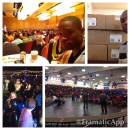What is help?
When is help needed? How should it be given?
Dictionary Definition
help [ help ]
1. assist somebody: to make it easier or possible for somebody to do something that one person cannot do alone by providing assistance
2. advise somebody: to provide somebody with advice, directions, or other information
3. be useful: to make something easier or more likely
Jullien’s Definition
Help is holding a door to an alternative path open as wide as you can for as long as you can for someone.
True help strengthens rather than weakens. It’s goal is self-sufficiency, not unnecessary dependency. Though I think that life is interdependent, I also think that there are areas where we should be self-sufficient. Oftentimes we help according to what we think is best for someone. But how do we know? Here’s a short story that captures how we can hurt people even when our intention is to help them.
[quote] One day a man saw a butterfly shuddering on the sidewalk locked in a seemingly hopeless struggle to free itself from its now useless cocoon. Feeling pity, he took a pocket knife, carefully cut away the cocoon and set the butterfly free. To his dismay it lay on the sidewalk, convulsed weakly for a while, and died. A biologist later told him, “That’s the worst thing you could have done! A butterfly needs that struggle to develop the muscles to fly. By robbing him of the struggle, you made him too weak to live.” I repeat, “By robbing him of the struggle, you made him too weak to live.” [/quote]
So how can we help better? We can hold the door to an alternative path open as wide as we can for as long as we can. In doing so, we allow the people we want to help to window shop-to peak in and do their own cost-benefit analysis.
The costs include:
-changing a comfortable behavior
-the time & energy cost of the new behavior to get at least the same result they were getting before
– the time it takes to get back to at least where they were using the old way
– the time & energy cost to sustain the new result (ie going to the gym 4x per week and waking up earlier)
– any financial cost (ie gym membership)
– social cost or hard to accept changes in perception of and relationship to self and friends
These are where the most excuses come from and the reasons procrastination occurs.
The benefits include anything that brings them on closer proximity to what they want or their DREAM (Desired Relationships Employment And Money).
1. Does your help improve their relationship to themselves, family, friends, colleagues, community, strangers, etc?
2. Does your help allow them make a more meaningful and unique contribution through work?
3. Does your help move them in the direction of financial freedom?
Ultimately they have make the choice. Education, not persuasion, is the tool.
Helping others is how we create value for the world and ourselves. But we can only give someone what they want. So help starts with listening to those we want to help, not telling. What’s best for us is not necessarily what’s best for someone else. Only I can determine what is best for me and what’s best for you may not be what’s best for me. So true help closes a gap between where/who someone is and where/who they want to be. The helpers exhibit unconditional love by being there to help without expectation for the people they are helping or unrequested influence on what the people need or want. Love is being there just because.
When I ask young people what they like doing, most say “I like to help people.” That’s great but it’s only the beginning. The next questions are:
1. Who have you helped?
2. How do you think you helped them? How did you help move them from some point A to some point B?
3. Did you enjoy helping in that way? Did you help with love?
4. Who else could use this kind of help?
5. How could you help in a deeper way?
I think that the purpose of this inherent desire to help is to foster our interdependence and the beauty it creates when your strength makes up for my weakness and my strength makes up for yours. The desire to help shifts us from selfishness to selflessness. My greatest moments in life have occurred when I really helped someone or someone really helped me. It’s such a gift and gifts can only occur when there is a gift giver and a gift receiver (who may also be a gift giver too). Without help, we would only be half of who we are because we have accomplished more together than we have alone. Our desire to help allows us to see our power, our purpose, and ourselves in one another.
Most arguments as based on the definition of one word…education, democracy, love, marriage, moral. If we can’t accept or articulate each others definitions, we cannot come to an agreement.



